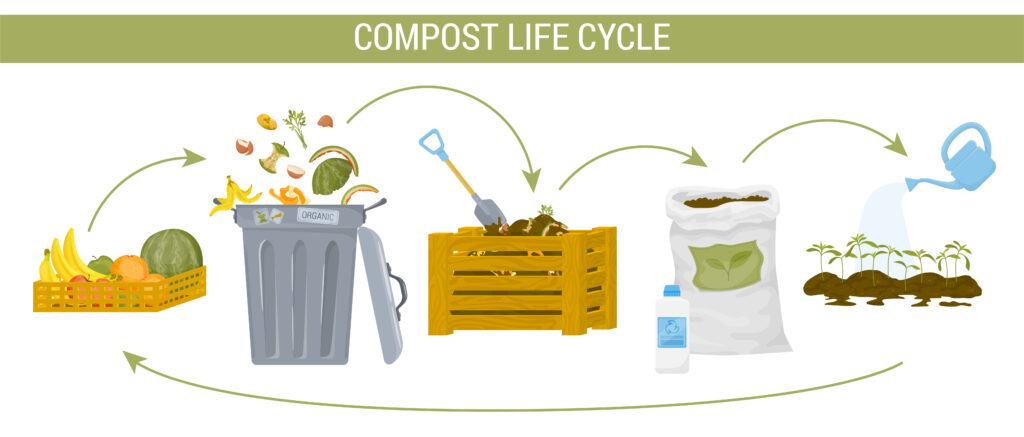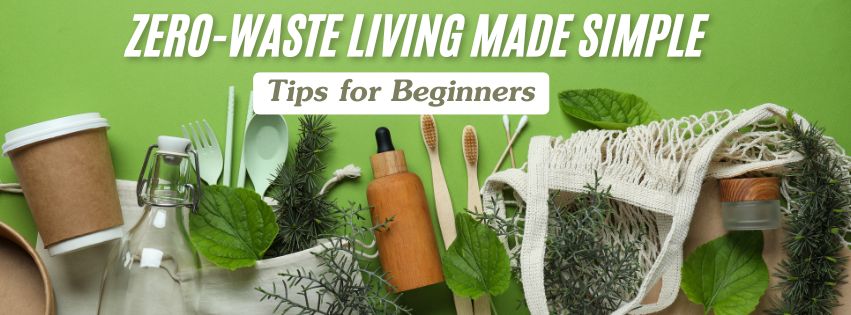Living a zero-waste lifestyle isn’t just about reducing what you throw away—it’s about rethinking how you use, reuse, and interact with the environment.
The idea of zero waste living is overwhelming yet by taking smaller steps and gradual efforts we can make our journey easy and rewarding as well can achieve our goal slowly. When we adopt simple, beginner-friendly habits and take meaningful steps to reduce waste we make a positive impact on the planet.
In this blog, we’ll explore some practical tips to help any individual live a zero-waste life with ease and confidence.
To start with we need to understand what exactly it means by Zero Waste living, why is it important to live Zero Waste lifestyle.
Zero-Waste Living – What does it mean?
Zero-waste living is a mindset and lifestyle that aims to reduce waste by making thoughtful choices about how we use and dispose of things. As we use products which are reusable, recyclable, and compostable we indirectly reduce waste ending in landfills. To start the journey its not essential to be perfect, but by putting our conscious efforts we can create a daily life with minimal waste. Understanding zero waste starts with small, actionable changes that align with the principles of sustainability, helping us live more harmoniously with the planet.
Why its essential to adapt to Zero Waste Living?
Let’s explore the importance of Zero Waste.
As we start our journey of zero waste, try to refuse usage of plastic straws and unnecessary packaging items. This will reduces source of usage which in return lowers the demand, ultimately leading to a positive and lasting environmental impact.
Landfills are primary source of greenhouse gas like methane that leads to global warming. When we reduce waste the junk ending in landfills also decreases means it will lower gas emissions maintaining optimum atmospheric composition.
As we adopt the technique of reuse or recycle the demand of raw materials like timber, water and fossil fuels lowers that indirectly conserves the natural resources. The best options is to increase the usage of reusable items like water bottles, shopping bags and cloth napkins that reduces their requirement for frequent purchases which in return saves money and produce less waste.
The other noteworthy benefit of incorporating the practice of zero-waste is using natural and non-toxic which are safe for everyone. Using such products improvise our and our family’s personal health and support nature’s health too.
Basics Steps towards Zero Waste.
As we start incorporating zero waste lifestyle the first thing to remember 5 R’s of waste management. These 5 R’s are refuse, reduce, reuse, recycle, and rot. This basic understanding will guide and facilitate our journey to a more sustainable lifestyle
In short each “R” represents a step toward reducing waste and promoting conscious consumption. When we follow this principle we make intentional choices, like “reduce what we throw” and “reuse what we posses” that ensures as little as possible ends in landfills. In fact, they outline a practical approach to managing consumption and waste, focusing on prevention, mindful use, and sustainable disposal.
Thus, understanding and applying the 5 Rs is a great starting point for anyone looking to adopt a zero-waste lifestyle.
Refuse :
In order to take, the first step into this journey we need to focus on selecting of items we use in our day to day life. So start saying “No” to unnecessary items like single-use plastics and freebies.
So when we lower the usage of items like plastic straws or packing items we reduce the demand. Thus leads to decline of production of such items which itself is quit impactful for better environmental conditions.
We can implement this idea by carrying reusable water bottle and shopping bag. Also politely declining flyers, plastic utensils or excess packing.
Reduce :
The next step to minimize what you bring into your life. In other words focus only on what you really need and avoid irrelevant buying. Reducing consumption itself is first step of reducing waste and conservation of natural resources. This habit encourages a minimalist mindset which can save money and promote clutter free life.
We can apply this by buying bulk to minimize packaging, selecting quality products over quantity and choosing products with longer lifespans.
Reuse :
Its easy to extend the life of items by repurposing, repairing, or finding reusable alternatives. This have multiple benefits like saving money, lowering the waste ending in landfills as it indirectly reduce production of new items.
The idea of reusing can be applied by buying refillable containers, repairing or modifying older clothes, repurposing older furnitures or containers.
Recycle :
Sorting of materials like paper, glass and aluminum individually helps them recycling it into new product. As recycled it reduces need for fresh raw material and energy required for processing it. Usage of any item should be first reduced or reused or can be refused and recycling can be opted as final resort.
The crucial step for starting the process of recycling is to first analyze local recycling guidelines. These guidelines help local bodies to make the list of waste in the particular neighborhood, this process help in sorting and initiation of quick recycling process.
Rot :
Composting organic waste like food leftovers, yard trimmings etc to reduce waste going to landfill. We can use this organic waste as organic fertilizers for our gardens just by adopting various composting methods.
The organic waste from our houses gets pilled up in landfills starts degrading resulting in generation of methane-a greenhouse gas leading to global warming. On other hand this bio-waste can be a used as organic fertilizer through composting at local or household level.
We can apply this by setting up compost bin in our backyard or using indoor compost bins for smaller spaces.
The organic waste improvises the soil quality and why soil quality is important read more –
Seven No-Fuss Ways to Go Zero-Waste in Your Daily Routine
Some basics changes in our daily habits can promote reduction of waste. There are few options which can be economically beneficial which reduces our cost of living. An individual doesn’t always have to go out of the way to incorporate these changes. Let’s explore these ways –
Effortless Ways to Begin Your Zero-Waste Journey
1. Make easy swaps :
The smart swaps like plastic water bottles instead of stainless steel or glass bottles, regular straws with reusable straws or using of cloth bags for grocery shopping will protect nature and saves money too. Do consider using beeswax wraps or silicone lids as they are smarter, eco-friendly alternative to harmful plastic wraps, which often end up in landfills and break down into polluting microplastics. When we carry reusable coffee cup it offers a great option to avoid one time use cups.
2. Smarter shopping :
When we buy products like shampoo, detergent, or handwashing liquid in bulk it will reduce packaging waste also helps save money.
When we buy local produce it supports farmers who often offer unpackaged items. As it cuts down on waste like plastic wraps and bags.
As we just buy new products without first checking thrift stores or garage sales leads to increase demand for mass-produced items. Tools, small furniture, gardening supplies, rugs, and flower pots are often available secondhand in great condition. When we select pre-loved items it helps reduce the need for new production and conserves valuable raw materials.
3. Embrace DIY Solutions
Do it yourself is a great idea to conserve resources because it save money, cuts down on packaging items and reduces production of new products.
Products like natural cleaners, shampoo or soaps using simple ingredients like baking soda, vinegar, lemon and essential oils can be easily made at home. These products when made at home will have less harmful chemicals and are more eco-friendly. Reusable cloth napkins can be made from old fabric instead of buying kitchen napkins or rugs from store.
Using old glass jars as storage containers or planters is a simple way to cut down on the use of plastic alternatives. It helps reduce the demand for non-biodegradable plastic planters while giving new life to items you already have.
4. Mindful Meals, Minimal Waste
Firstly we should always check what’s in the pantry, fridge, or freezer first. This helps us avoid buying things we already have. Secondly, preparing a meal plan helps guide what we actually need.
When we plan meals in advance, it’s easier to make a detailed grocery list. This prevents impulse buying and also helps save money.
If we invest in good quality reusable containers and jars its helps keeping food fresh for longer time. If we learn about advanced storage techniques we could extend shelf life of fruits, vegetables and grains.
5. Practice Digital over Paper
Using digital copies instead of printed options reduces usage of paper saving trees. For example utility bills, bank statements, boarding passes, receipts, invoices etc can be in digital form.
We love reading books but what if we switch to digital copies? Instead of printed books we can opt for e-books or audio books which are easy to carry and durable too.
In this modern world we have got many digital options which can replace traditional writing options. For example, using digital note taking tools in place of traditional sticky notes or writing papers.
6. Choose to Repair, Not Replace
Repairing cracked screens or broken buttons can extend life of devices thus we can avoid buying new device. Our clothes can get a second life just by repairing torn seams, replacing missing buttons, and fixing broken zippers. Fast fashion is huge threat to nature, just revamp your old clothes and enjoy it.
The regular maintenance of devices and appliances improves its functioning. Instead, replace faulty parts, worn-out filters, or small components. This helps keep your items working like new. Thus we save money and resources by avoiding buying of new devices.
7. Compost Organic Waste
Composting is a natural method of recycling organic waste without any negative impact on environment. Firstly we should learn segregation of compostable and non compostable items for better results. Later we need to choose the composting technique that suits our lifestyle and space. These steps are important because sustainability depends on convenience and consistency for long-term success.
For example use backyard composting method for larger outdoor space and indoor compost bins or worm bins in apartment or small indoor spaces.

If its difficult to compost on our own an individual can participate in local or community composting programs. This way its convenient to drop off waste without the need of personal maintenance.
Learn more about composting –
https://www.epa.gov/sustainable-management-food/approaches-composting
Some habits can reduce waste naturally do read –
Sustainable Living Begins with You
Starting a zero-waste journey doesn’t require perfection—it’s about progress and conscious choices. When we incorporate small, simple habits into our daily life, like recycling, composting, or thoughtful meal planning, we can make a meaningful impact on the planet.
Zero-waste living isn’t just about reducing waste; it’s just a mindset shift toward living more sustainably, valuing resources, and reducing your environmental footprint. The every effort we take counts, and by starting small, we can contribute to a collective movement for a healthier, greener world.
We can take one step at a time, celebrate our progress, and inspire others to join our journey. Together, we can create a sustainable future—one choice, one habit, and one step at a time.
“With every small action, let’s commit to creating a cleaner, greener, and more sustainable world.”

Leave a Reply